TRANSFER(S): From Osnabrück to Tamale
Discursive programme at Savannah Centre for Contemporary Art (SCCA)
Tamale, Ghana
November 28 - December 1, 2023
The solo exhibition and research project by Ibrahim Mahama dubbed TRANSFER(S) morphed into discursive and relational forms in its second phase and shifted its locus from Osnabrück in Germany to Tamale in Ghana. From 28th November to 1st December, Red Clay and its sister institutions—Savannah Centre of Contemporary Art (SCCA) Tamale, and Nkrumah Voli-ni (institutions founded by Mahama)—hosted a plurality of perspectives coming together to supplement the artist’s and curators’ positions. To this end, weavers, economic historians, academics, technicians, musicians, publishers, fellow artists, and curators were invited as co-producers with whom to think through themes such as the dialectics of the Westphalia System in terms of sovereignty and postcolonialism; Germany’s proto-industrial linen production and its global economic entanglements; the roots of art education in Ghana dating back to German vocational education and British colonialism; and Emancipated futures and solidarity. The sessions took place within and around Ibrahim Mahama’s generative installation at Red Clay named Parliament of Ghosts in the form of symposiums, community-based workshops, temporary exhibitions, durational performances, lectures, and live music. The contributors included Akosua Adomako Ampofo, Bernard Akoi-Jackson, Koliko, Isaac Gyasi, Thorsten Heese, Anna Jehle , Priscilla Kennedy, Bettina Klein, Ibrahim Mahama, Kwasi Ohene-Ayeh and Bettina Klein, Zohra Opoku, Juliane Schickedanz, Gabriel Schimmeroth, kąrî’kạchä seid’ōu and Klaus Weber.
TRANSFER(S) was launched in Germany on July 8 en plein air with a monumental installation of Mahama’s montaged tapestry of strip-woven textiles, decommissioned jute sacks and batakaris (traditional garments cumulated from the northern region of Ghana) which draped the south-west, south-east, and north-east façades of the now-closed Galeria Kaufhof building in Osnabrück until October 1st, 2023. The exhibition engages a plurality of historical and contemporary flows, knots, and contentions between Central Europe and West Africa with Ibrahim Mahama’s art practice as its muse. The project is commissioned by the Kunsthalle Osnabrück on the occasion of its 30th anniversary to doubly respond to the legacy of the Westphalia Peace Treaty—signed in the neighboring towns of Osnabrück and Münster 375 years ago—and the history of textile production in Osnabrück.
TRANSFER(S) engages textiles in seven registers: as signifier, image, means of production, cipher, material, technology, and form of sociality. The exhibition taps into the complexities of the thematic points and engages them as integers of encoded economic, aesthetic, and socio-political relations transcending oceans and borders on a planetary scale. In this scope, the project aims to come to terms with the centrist-hierarchical power dynamics latent in these relationships which have engendered domination and exploitation since feudalist and mercantile capitalist regimes into our present day, while also generating alternative, disjunctive, and emancipatory trajectories through Mahama’s artistic vision and other discursive positions in an extended programme in Ghana.
Local partner institutions: SCCA Tamale, Red Clay, Nkrumah Voli-Ni (all three institutions are founded by Ibrahim Mahama) and blaxTARLINES KUMASI
Profiles:
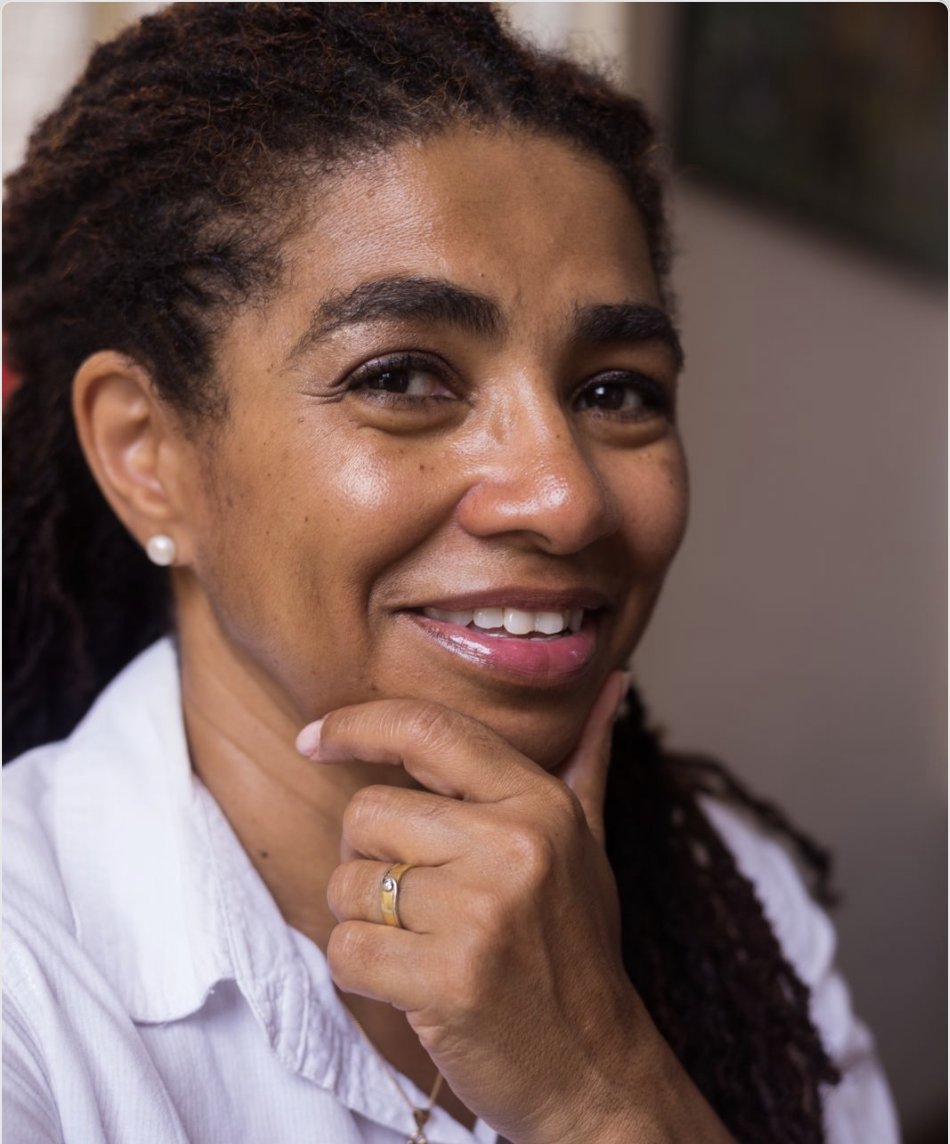
Prof. Akosua Adomako Ampofo is Professor of African and Gender Studies at the Institute of
African
Studies, University of Ghana. Her areas of interest include African
Knowledge systems (and ‘decolonizing’ knowledge and praxis);
Higher education; Race and Identity Politics; Gender relations; Masculinities; and Popular Culture.
She describes herself as an activist scholar, and her work is informed by her faith,
questions of identity and power, and a commitment to social justice.
In 2022 she co-produced the documentary When Women Speak with Kate Skinner (and directed
by Aseye Tamakloe) as part of the project “Archive of Activism: Gender and Public History in Postcolonial
Ghana”. Adomako Ampofo is the founding vice-president and immediate past President of the African Studies
Association of Africa, and a Fellow of the Ghana Academy of Arts and Sciences. She is currently the Wangari
Maathai Visiting Professor at the University of Kassel.
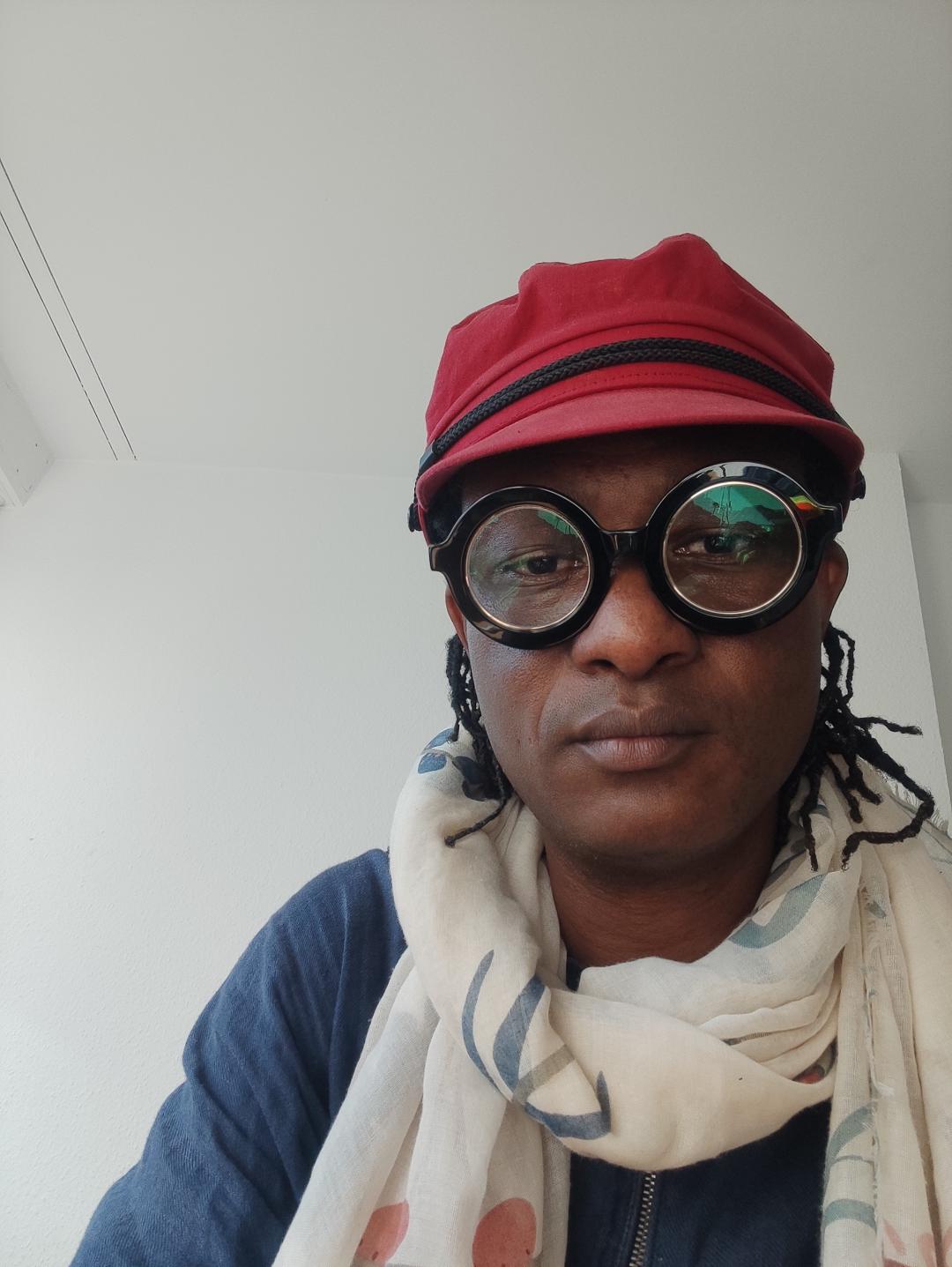
Bernard Akoi-Jackson (PhD) is a contemporary Ghanaian artist writer, curator and educator who
lives and works from Tema/Accra/Kumasi or any site that loosely falls within his post-studio praxis. His
general artistic practice and research trajectory revolve around his notion of ‘disturbed methodologies’,
comprising a critique of post- and de-coloniality; an investigation of quotidian interactions and gestures
through movement and object-oriented situations; and an engagement of linguistic quirks via textual
inventions, revisions and wit. Akoi-Jackson is drawn to the politics of such vestiges of colonialist
encounter as overtly bureaucratic rituals that lead to procedural stalemate in society. His
multi-disciplinary, audience-implicating installations and performative pseudo-rituals, have featured in
exhibitions across the world.
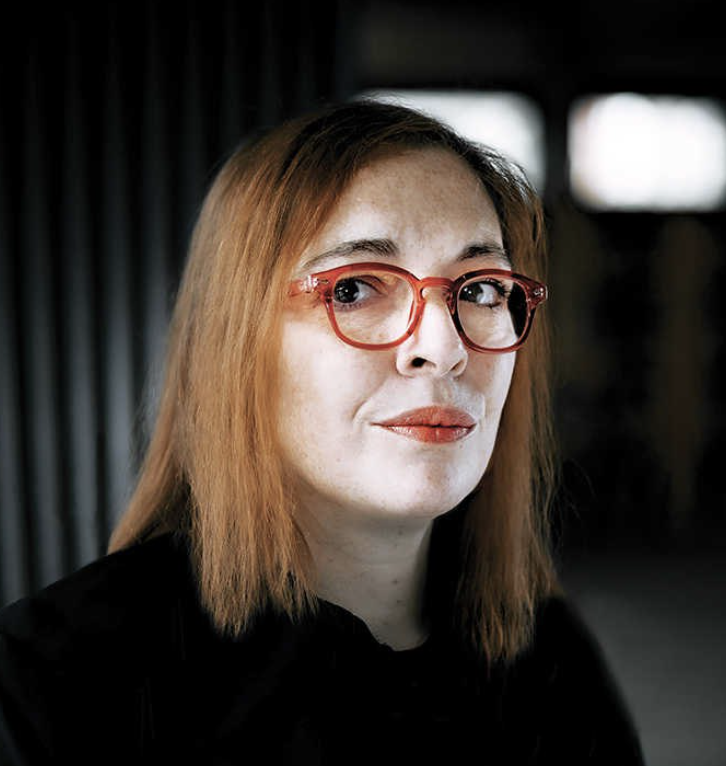
Chiara Figone s a researcher, editor and curator based in Dakar and Berlin.
She is the founder and artistic director of Archive,
a non-profit organization operating out of Berlin, Dakar and Milan.
She is the publishing director of Archive Books and editor-in-chief of Archive Journal and she is part of
the collective AWU based in Dakar the recently opened a feminist library in its space in collaboration with
Archive.
Figone is professor of editorial studies and art publishing at Nuova Accademia di Belle Arti – NABA, Milan.
Most recently she co-curated Publishing Practices (2021-22) and Crossings (2022).
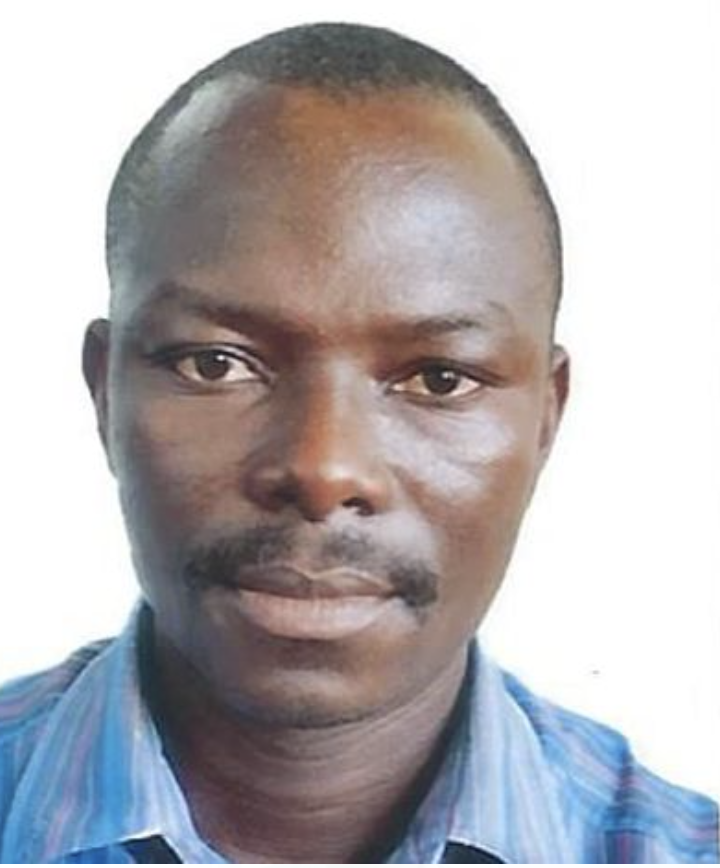
Isaac Gyasi is a weaving artist who has over 20 years of professional experience in textile
design and practice, imparting knowledge of traditional Ghanaian weaving (Kente, Kete, Fugu), tapestry
weaving, and broadloom weaving to students from KNUST and elsewhere. His outstanding contributions to design
education and promotion, inventions and enhanced functionalities in weaving and fabric colouration are
well recognised among many students. He has been weaving with straw, palm fronds, bamboo, and
plantain fibres as well as dye colouration. His weaving practice aims at tracing and innovative
synergizing the local technologies in the historical antecedents of traditional weaving and the
contemporary weaving technologies. He does this by weaving and creating traditional designs that
reconnect with the lost and unidentified Ghanaian cultural heritage as well as the unique hallmarks of
‘authentic' design complexities, patience, and resilience.
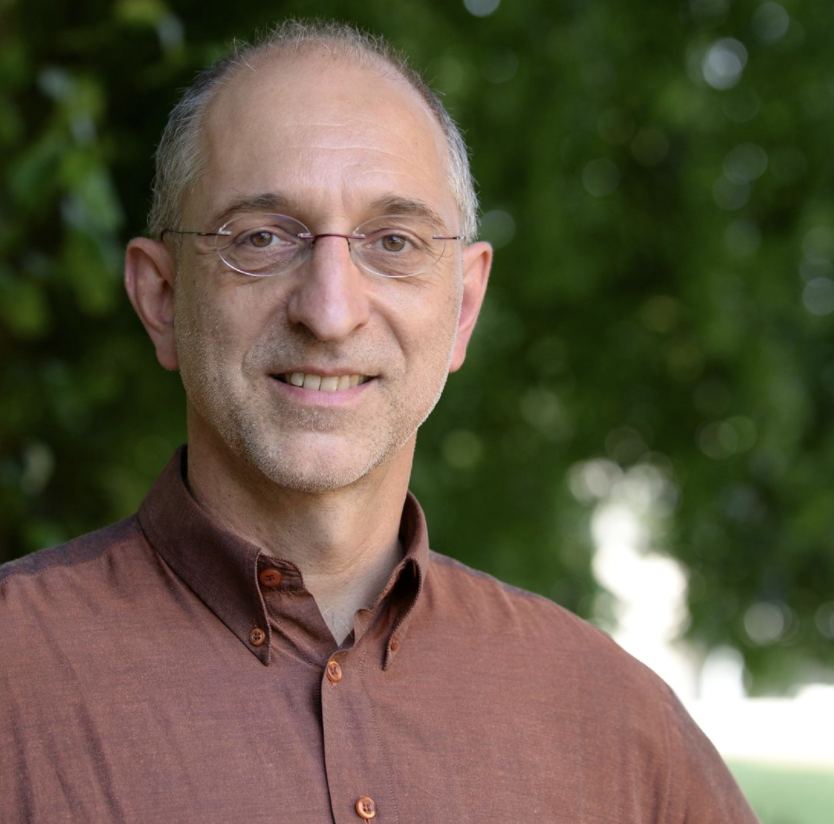
Thorsten Heese studied History, Political Science and Art History in Osnabrück (Germany) and Hull
(Great Britain). In 2002, he obtained his Ph.D. at the Martin-Luther-University of Halle and Wittenberg. He
is Co-Director and Curator for Local and Cultural History at the Museumsquartier of Osnabrück. He also is
temporary lecturer for Museological Didactics and Museum Education at the University of Osnabrück. His
scientific publications and editions deal with museology, history didactics as well as the history of
colonialism, migration and National Socialism. His last publication offers “Glocal History” as an exhibition
concept and perspective to decolonize historical museums and exhibitions.
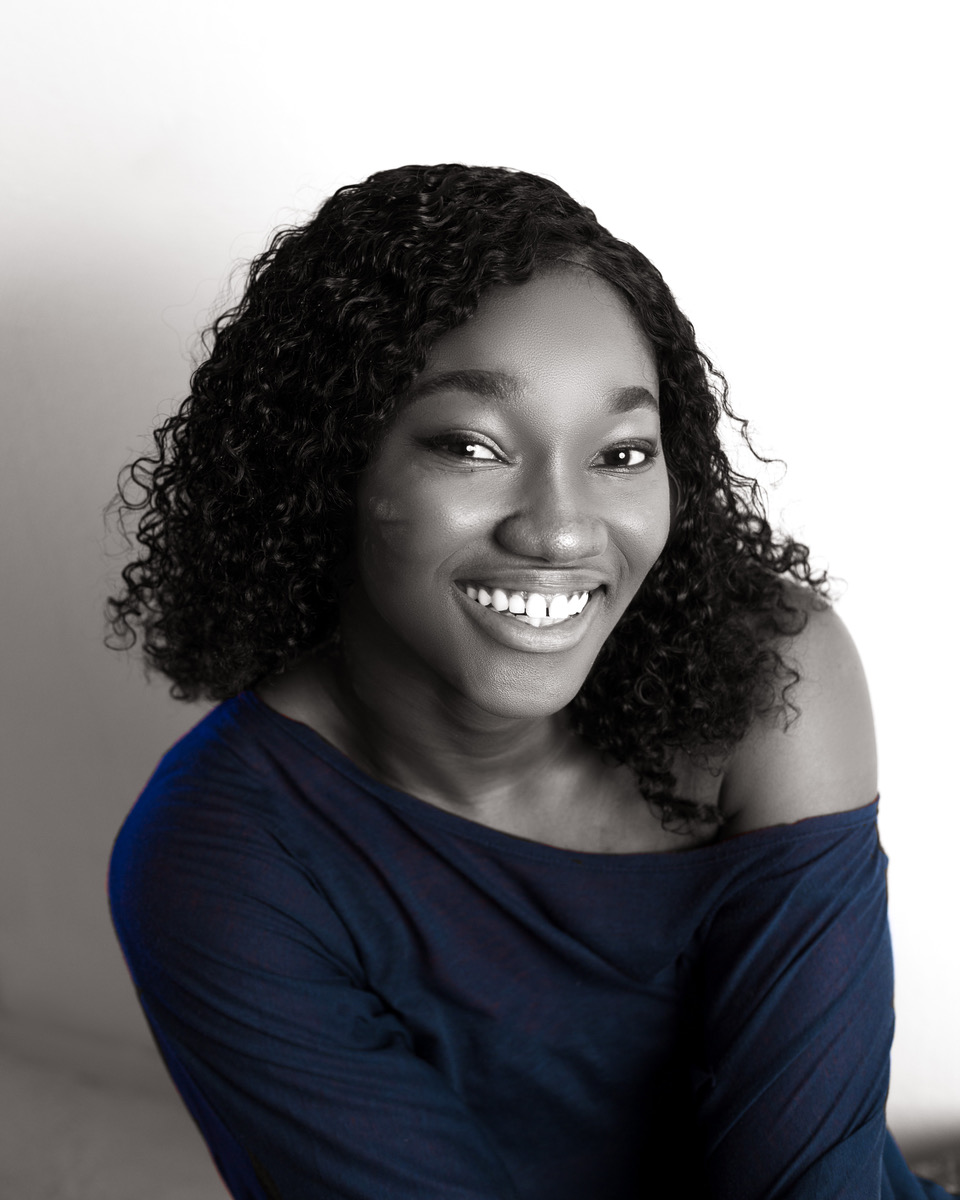
Priscilla Kennedy (b. 13. 07. 1994>) holds a Bachelor of Fine Arts degree from the Kwame Nkrumah
University of Science and Technology. Notably, she won the esteemed First Merit Award in the Barclays
L'atelier Art competition in South Africa and was honoured as the recipient of the 2022 Yaa Asantewaa Art
Prize. With a multidisciplinary approach, Priscilla Kennedy intricately weaves connections between body,
race, sexuality, and fictional histories of objects with hybrid life forms. Her artistic practice
encompasses diverse media, such as painting, tapestry, and light. These result in a tentacular
deconstruction of the female body, including her own, as a multi-site for engaging conversation.
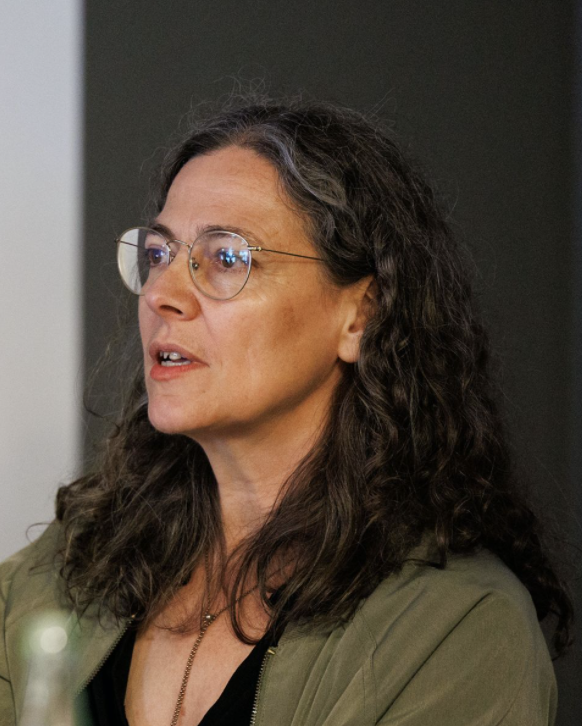 Photo credit: Friso Gentsch
Photo credit: Friso Gentsch
Bettina Klein is an art historian, independent curator, and author based in Berlin. She holds an
M.A. in Art History and French Literature (Freie Universität Berlin). From 2013 to 2018, she was Head of the
Visual Arts at the DAAD Artists-in-Berlin Program. She was curator at the Centre Européen d'Actions
Artistiques Contemporaines in Strasbourg, France (2009-2012) and lecturer at weißensee kunsthochschule
berlin (2011-2012). She has curated numerous exhibitions as well as projects in public space, including:
Restless Monuments Berlin, interventions in public space (2021-2023); Peilung, series of encounters with
Ukrainian artists, filmmakers and scientists, co-curated with Lada Nakonechna, daadgalerie, Berlin
(2022-2023); Das Erscheinen eines jeden in der Menge, Galerie im Schloss Bellevue, Berlin (2021); Ibrahim
Mahama, a straight line through the carcass of history. 1918–1945. 2015-2018, daadgalerie, Berlin (2018);
Restless Monuments, co-curated with Naz Cuguoğlu, Zilberman Gallery, Istanbul (2018); Parlament der
Pflanzen, daadgalerie, Berlin (2017); Rayyane Tabet, Kopf hoch! Mut hoch! Und Humor hoch!, daadgalerie
Berlin (2017); Nouvelles de l’Île des Bienheureux, Musée du Château des Ducs de Wurtemberg, Montbéliard,
France (2016); Blind Spot, Mykola Ridnyi & Serhij Zhadan, Fassadenprojekt KuLE, Auguststraße (2015); Last
Sighting, daadgalerie, Berlin (2015); The Ukrainians, daadgalerie, Berlin (2014).
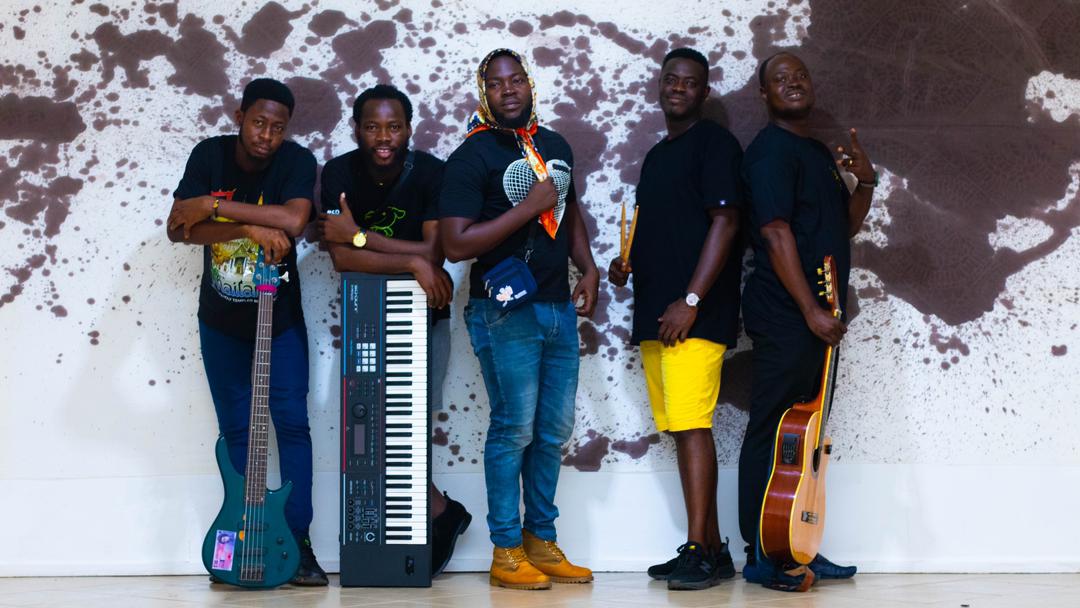
Koliko (collective) constitutes a loose collective of practitioners who share an interest in
music and are based in Kumasi, Ghana. For the group music is a tool for entertainment and for the soul which
ought to be available to everybody, irrespective of age, class, gender or racial background. Koliko’s music
functions as a medium through which to express these egalitarian ideals. Inspired by the legendary Dr.
Daniel Amponsah populary known as AGYA KOO NIMO, Afrobeat band Osibisa, founded in the late 1960s, and Kwame
Yeboah’s “Ohia Bɛ Yɛ Ya” band, the group’s cosmopolitan sound appropriates from local highlife music
(Adadamu, Burger highlife, etc), Jazz, Soul, Calypso, et al.
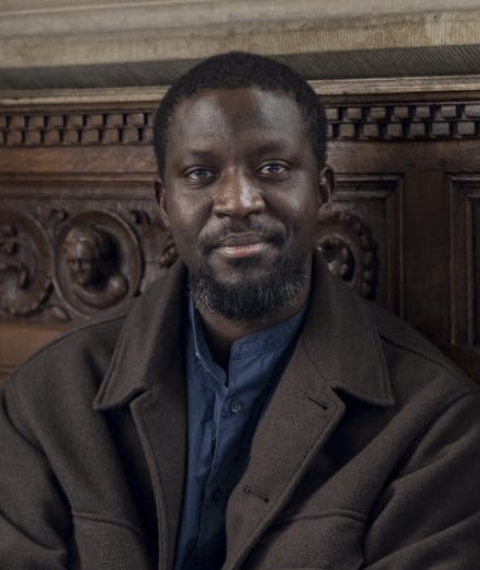 Photo credit: Angela von Brill
Photo credit: Angela von Brill
Ibrahim Mahama (b.1987) lives and works in Accra, Kumasi and Tamale, in Ghana. His
politically-driven practice explores themes such as the contradictions inherent in economic globalization,
labour relations, and creating inclusive, sustainable infrastructure in conditions of hopelessness. His work
has been included in numerous international exhibitions such as the 35th Bienal de São Paulo (2023), Sharjah
Biennial 15 (2023), the 22nd Biennale of Sidney (2020), the 56th and 58th Biennale di Venezia (2015, 2019),
the 6th Lubumbashi Biennale in the Democratic Republic of Congo (2019) and Documenta 14 (Kassel, Athens,
2017). Various diverse major solo exhibitions have featured the work of Ibrahim Mahama, including
TRANSFER(S), Osnabrück, Germany & Ghana (2023); Garden of Scars, Oude Kerk, Amsterdam (2022); In-Between the
World and Dreams, University of Michigan Museum of Art (2020); Parliament of Ghosts, The Whitworth,
University of Manchester (2019); a straight line through the carcass of history. 1918-1945. 2015-2018,
daadgalerie Berlin (2018); and Coal Market, Schloss Strünkede, Emschertal-Museum, Herne (2018). Mahama is
the artistic director of the 35th Ljubljana Biennale of Graphic Arts (2023-2024). He is the founder of SCCA
Tamale, Red Clay and Nkrumah Volini—sister institutions engaged in hosting cultural, techno-scientific, and
artistic programming in Tamale, Ghana.
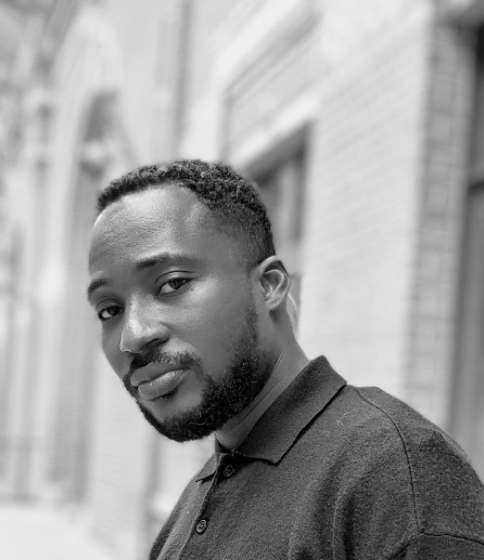
Kwasi Ohene-Ayeh is a curator and critic based in Kumasi, Ghana.
He is a key member of the blaxTARLINES coalition whose work is compelled by the radical hope proposed by the
artist-intellectual kąrî’kạchä seid’ōu to “transform art from the status of commodity to gift”.
Ohene-Ayeh’s work in the fields of pedagogy, criticism, curating, and art stretches across teaching at the
Department of Painting & Sculpture,
Kwame Nkrumah University of Science and Technology (KNUST) in Kumasi, to running the annual peer-led,
schizo-pedagogical, and inoperative art school project called CritLab since 2020 as a member Exit Frame
Collective in Ghana.
He has co-curated TRANSFER(S) (2023), Ibrahim Mahama’s solo exhibition in Germany and Ghana, the 35th
edition of the Ljubljana Graphic Arts Biennale with Exit Frame Collective (2023-2024),
the 12th edition of Bamako Encounters: Biennale of African Photography (2019-2020), Akutia: Blindfolding
the Sun and the Poetics of Peace (A Retrospective of Agyeman Ossei ‘Dota’ (2020-2021), Orderly
Disorderly (2017), among others.
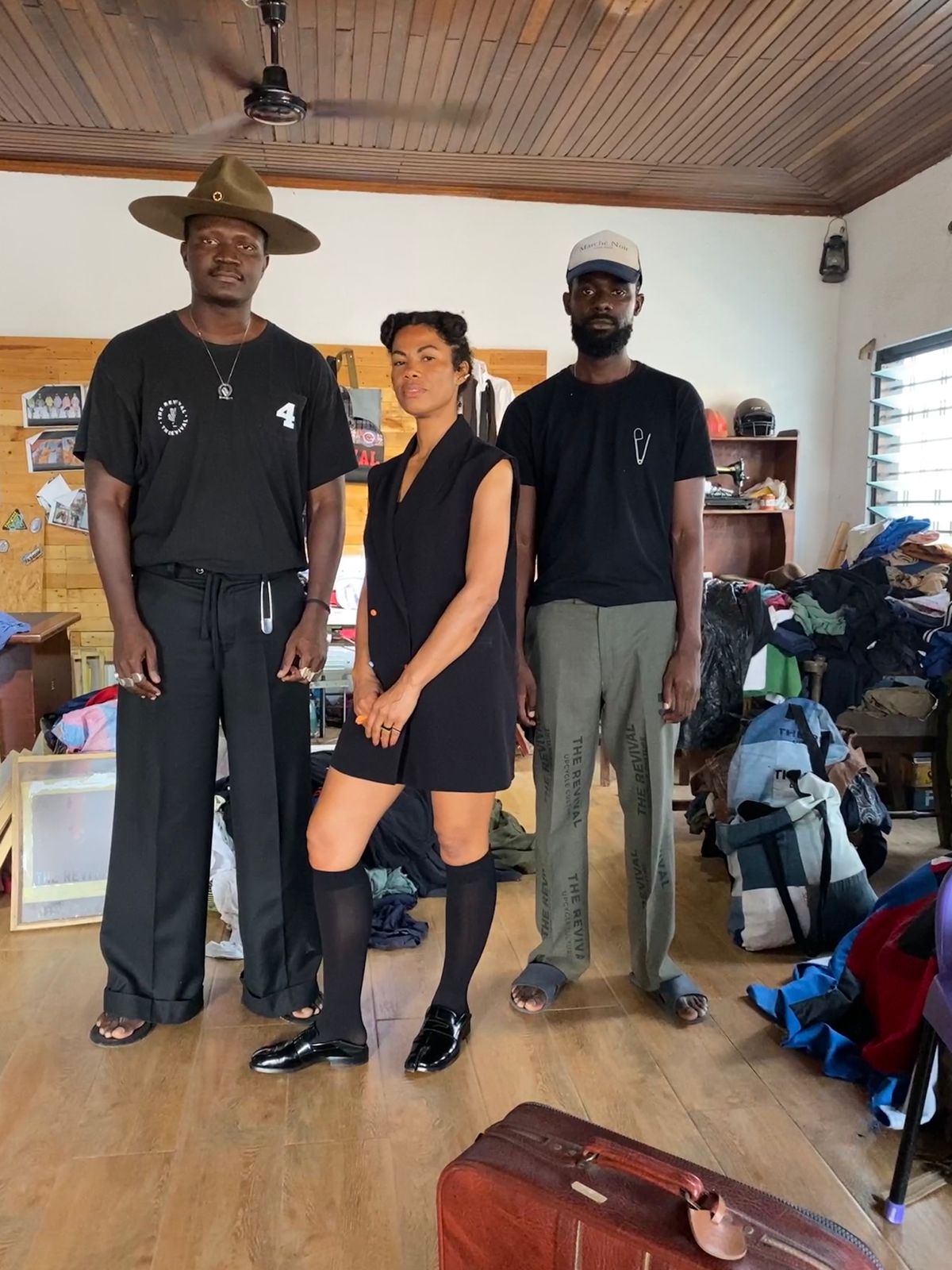
Zohra Opoku and The Revival: A collaborative body of work by Ghana-based artists Zohra Opoku and
The Revival (co-founded by Kwamena Boison & Yayra Agbofah) which is a community-led sustainable design
non-profit entity educating and creating awareness with upcycled global textile waste. For Zohra Opoku, this
collaboration will be a continuation/extension of her ‘WHO IS WEARING MY T-SHIRT' series, which was devoted
to the work of unpacking interconnectedness, highlighted at the intersection of trade and textile. Zohra
Opoku’s ongoing series explores the fraught relation between the second-hand Imports to Sub-Saharan Africa,
the modern African textile industry and traditional African attire.
About the project:
An immersive installation unfolds, featuring patchwork-style vintage textiles from Kantamanto. In a
traditional-inspired procession, Kayayei women gracefully transport the piece on wooden boards and aluminum
bowls, resulting in a captivating final image—a suspended hut shape gracefully occupying the space.

Gabriel Schimmeroth is a curator, historian and head of public programming at the Museum am
Rothenbaum
– Kulturen und Künste der Welt (MARKK) in Hamburg, Germany.
He is responsible for the experimental project space ‘Zwischenraum –
A Space Between’ and the project ‘MARKK in Motion’ (2018-2023),
which is part of the Initiative of Ethnological Collections of the German Federal Cultural Foundation.
He was part of the interdisciplinary curatorial teams of the exhibitions Fleisch [Flesh/Meat] (2018)
at Altes Museum, Staatliche Museen zu Berlin, Hey Hamburg, do you know Duala Manga Bell? (2021) at
MARKK, Archive of Experiences (2022) with Kelvin Haizel, part of the 8th Triennial of Photography
Hamburg and curated numerous interventions and public programs. His main areas of interest reach from urban
history and public infrastructures to the entanglements of museum, archive and memory politics with
contemporary art.
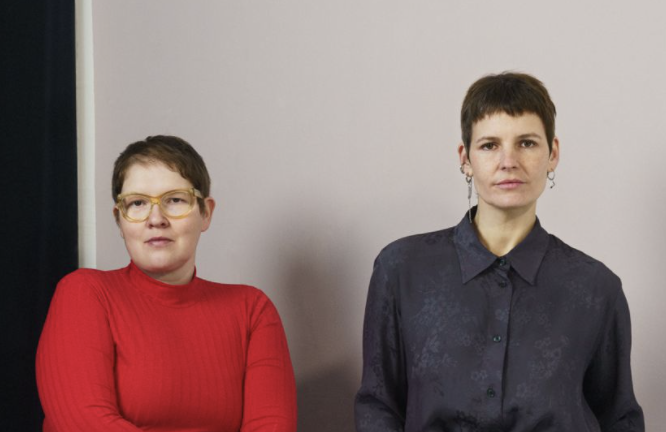 Photo credit: Felix Hüffelmann
Photo credit: Felix Hüffelmann
Anna Jehle + Juliane Schickedanz Since 2020, Anna Jehle and Juliane Schickedanz are co-directing
Kunsthalle Osnabrück, one of the most important platforms for contemporary art in northern Germany, located
in a former monastery and adjunct church. Curatorially, they work with annual themes such as
“Disappointment” (2020), “Accessibility” (2021) or “Romanticism” (2022). Based on a structural interest and
in the sense of a learning institution, the annual themes aim to tackle thematic complexes in a sustainable
and more comprehensive approach through new artistic productions by internationally renowned artists. The
Kunsthalle Osnabrück's programmes, which are conceptualised as processual and interdisciplinary, address
socio-politically relevant issues and place an explicit focus on the inclusion of social processes that
understand these issues as an integral part of cultural production. With its experimental and sensually
tangible exhibitions and art mediation projects, the Kunsthalle has become a place for discourse and of
conviviality that aims to transcend social boundaries.

Prof. kąrî’kạchä seid’ōu is an artist-intellectual, poet, mathematician, and educator. He is
Ghana’s key figure in non-proprietary art and a co-founder of blaxTARLINES KUMASI. He has mentored a growing
number of artists, curators, and writers. His practice has inspired an artistic revolution in Ghana. The
theme of 35th Ljubljana Biennale resonates squarely with his artistic and political ideas.
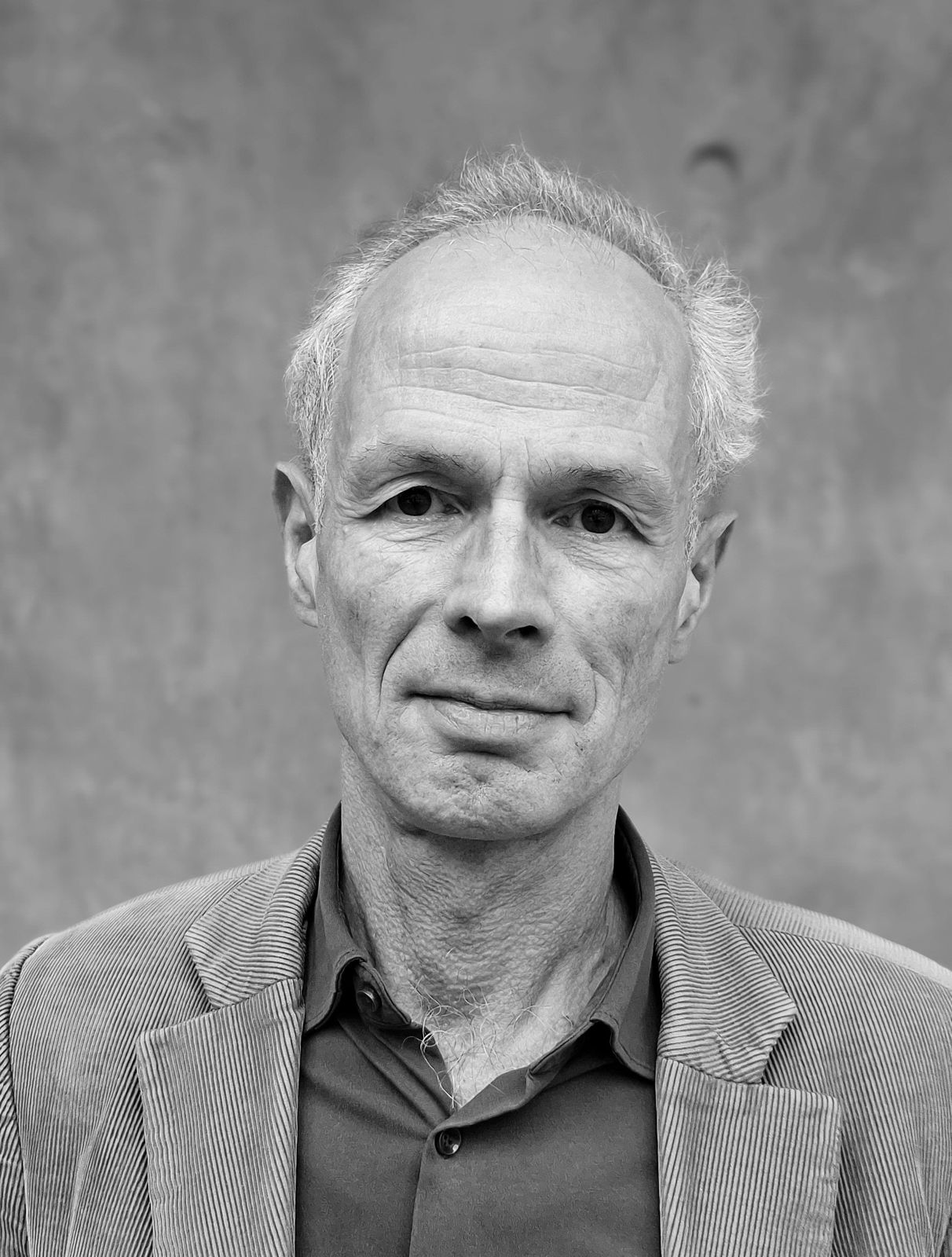
Prof. Klaus Weber is a historian and Professor of European and Social History at the Europa
Universität Viadrina
(Frankfurt on the River Oder). In 2001 he submitted a Ph.D thesis at Universität Hamburg on German merchants
in the 18th century Atlantic trade.
Weber’s research interests also explore labour and welfare regimes in modern Europe and the Atlantic world
and the global connections of central Europe’s early modern proto-industries.
His text Linen, Silver, Slaves, and Coffee: A Spatial Approach to Central Europe’s Entanglements with the
Atlantic Economy! (2015) is one of the main reference texts of this project.